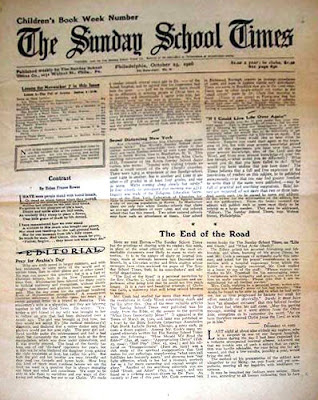 |
I have been re-reading the Christian classic In His Steps, by Charles Sheldon (1897). It was certainly one of the most influential books read in my high school years, and resulted in my choosing I Peter 2:21 as my life verse: "Christ suffered for you, leaving you an example, that you should follow in his steps."
In the book, one man who takes the challenge to always ask "What would Jesus do?" is a newspaper owner, who begins to transform his powerful paper into a Christian one. Of course he loses prestige, and money. As he recounts changes made after a few months he says, "Some say I will have a weak, namby-pamby Sunday School sheet. If I get out something as good as a Sunday-school it will be pretty good." He goes on to make a generalization that the Sunday school movement accomplished a lot of good, and wasn't weak at all.
I got to thinking about this, because many Christian endeavors are often characterized as weak, because they are genuinely meek instead. But I'm going to stick to the topic here of Sunday School. What has this movement really accomplished?
Its founding is credited to Robert Raikes and Thomas Stock in Gloucester, UK in 1780. It was established to educate and help children of the working poor, and was met with considerable criticism from those who didn't think the masses should be educated.
Facts
• Early on, it provided both spiritual and academic instruction, helping poor children prepare themselves for some life other than that of crime or hard labor.
• There is some evidence for Sunday Schools in America as early as the late 1600s.
• In 1824 the American Sunday School Union was formed and many schools were established. A notable example was the work of Stephen Paxon who founded 1314 schools in rural areas many of which grew into churches as the children matured.
Effects
• Children WERE educated. Remember that before 1870 children were not required to attend school in the United States.
• By 1889 American Sunday schools were performing the role of public education for 10 million children, sponsored and paid for by Christians
• some Marxist historians have credited 19th-century Sunday schools with empowering the working classes.
• Certainly SS classes have created generations of Christians with knowledge of the Bible. Consider that 500 years ago most people had never read a Bible passage for themselves.
• Sunday school provided a bright spot in the week when life, even for children, was usually dull and filled with work. Small toys, prizes, and interesting reading materials were coveted.
• Sunday School libraries often brought greater literacy to entire towns.
Sunday schools have fallen on hard times for a number of reasons, which are not the focus of this article.
The point is, if anything we can accomplish is as weak as Sunday School, we should be immensely satisfied, and certain that God has been glorified.